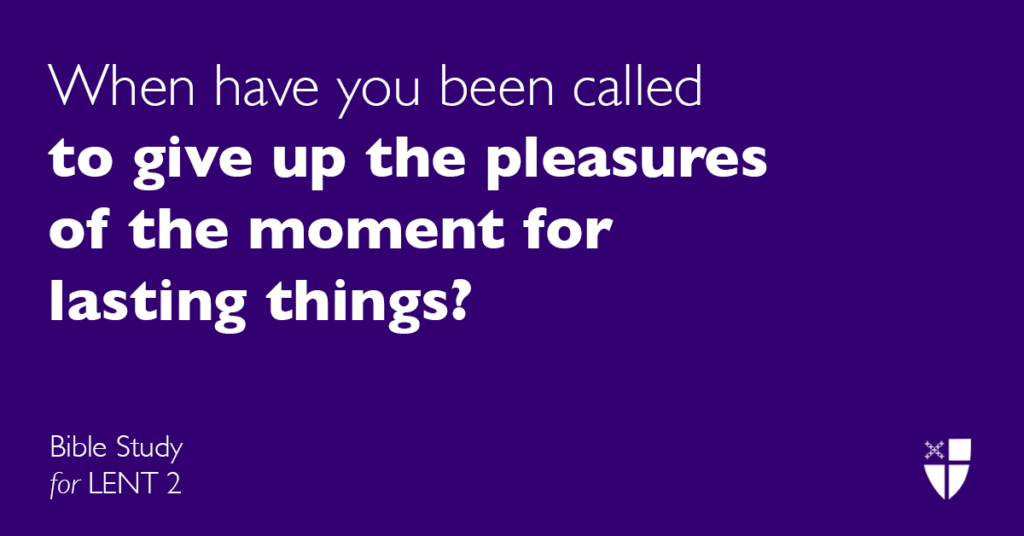This page is available in: Español
Bible Study: Lent 2 (B) – 2021
February 28, 2021
RCL: Genesis 17:1-7, 15-16; Psalm 22:22-30; Romans 4:13-25; Mark 8:31-38

Genesis 17:1-7, 15-16
In our passage, we witness another in a long history of exchanges between God and Abram. Abram listens, receptive and humble as God makes his everlasting covenant. The covenant is a promise that he and Sarai, heretofore childless, will be the forerunners of multitudes – of kings and of nations. This is a spectacular promise, given that Sarai and Abram are way beyond childbearing years. God gives Abram and Sarai new names, signifying their new role as the progenitors of multitudes with Yahweh as their God.
There are many instances in Abram’s life of going off in his own direction and being influenced by fear or the desires of others. He also has an abiding faith in God and follows God’s direction, even when that direction seems improbable and even impossible. Abram’s faithfulness pales in comparison to God’s generosity and grace.
- Recall a time when God’s generosity and promises gave you new direction.
- Our lives can seem small in comparison to the monumental story of Abraham. But God is as generous and faithful to us as to him. How would you describe God’s faithfulness to you today, and your faithfulness to him?
- In our passage, Abram’s only action is a humble acceptance of God’s promise and direction. How do you respond to God’s direction and promises?
Psalm 22:22-30
Our reading begins halfway through Psalm 22, following bleak moments of despair and death where pleadings and prayers have seemingly gone unanswered. Here is a turning point – an exhortation to praise and glorify the Lord. Why? Because God listens to those who share their pain with him. Because God is indeed with us in all things, even when we can’t sense his presence, even in death. And “us” means everyone, including the poorest and most forsaken among us. All will be heard, remembered, and satisfied throughout all times for those who turn to him. The final verses soar with a promise of deliverance of future generations. Our task is to keep praying, acknowledging that we are in dire need of God’s help and that he is our strength.
- This Psalm asks us to reflect on God’s presence and goodness even when we can’t feel them. If you agree, how would you express this to someone struggling with this idea?
- In our culture, the nature of God has often been described as above or looking down upon us, rather than with us – especially in our pain, our fallenness, our desperation. Describe how you see God being with and for us in hard times.
Romans 4:13-25
This passage from Romans is a bit like an ancient bible study on today’s reading from Genesis! Paul lays it out nicely: Abraham didn’t find the old laws the be-all, end-all – he took God at his word. Simply abiding the laws renders faith meaningless. Rather, Abraham’s faith is self-perpetuating, creative, and trusting. God’s promise that he would be “father of many nations” flows from Abraham’s faith. Paul reminds the Romans that God’s promise applies to them as well. And we, too, can take it to heart; faith and trust in God bind us to God’s creative and generative promises.
- How have you seen God do the seemingly impossible in your life or the lives of others?
- It’s easy to think that we must follow a lot of rules and do good things in order to be accepted by God, rather than trusting in his grace. How would you explain faith in God’s grace and promises to someone struggling with this concept?
Mark 8:31-38
Jesus is straightforward in this passage – no sugarcoating his fate. He will be rejected, suffer, die, and rise again, he tells his disciples, drawing a reprimand from Peter. Jesus in turn scolds Peter for thinking from a human perspective rather than a divine one. Jesus continues with a similarly difficult message for his followers. Following him means losing one’s life and taking up the cross.
To “follow” Jesus is to deny one’s own wants and desires and do the right thing – the thing given you to do. Jesus didn’t want to die on a cross, but we see that he was confident in the glory of God that was to come, despite the painful costs. Important to consider is that as someone who loved Jesus, Peter was well-meaning in his “human perspective”. Certainly, he shuddered at the thought of Jesus’ suffering and death.
- Recall a time in your life when you were on the receiving end of good intentions and loving advice that held you back from doing what you knew you had to do. Or a time when you’ve been compelled to advise someone away from doing something costly and painful that they felt called to do. Do you sense the tension between human and divine things in this recollection?
- This passage prompts questions about what we value and what we’re willing to give up for those values. When have you been called to give up the pleasures of the moment for lasting things? The popular choice for the more principled one? Profit for honor?
This page is available in: Español
Don’t forget to subscribe to the Sermons That Work podcast to hear this sermon and more on your favorite podcasting app! Recordings are released the Thursday before each liturgical date.
Receive Free Weekly Sermons That Work Resources!
This page is available in: Español


